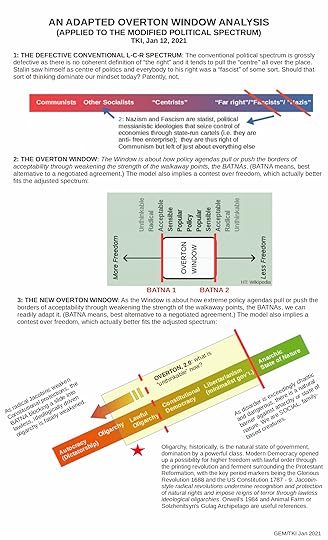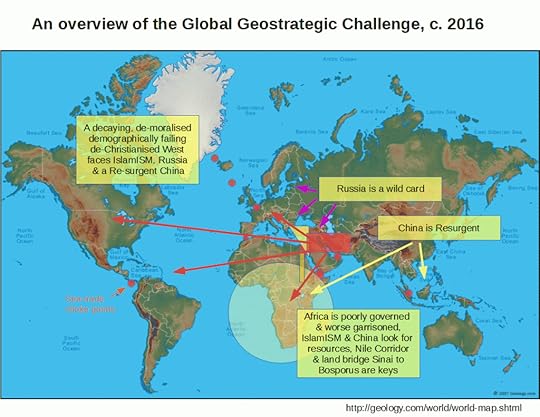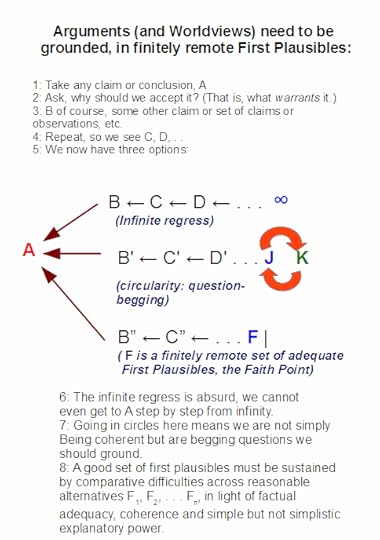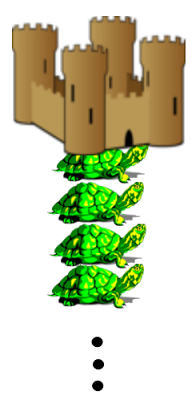Michael J. Behe's Blog, page 208
April 22, 2021
Giant corpse flower has lost most of its genes, grabbed some from its plant hosts
The varieties of Rafflesia, found only in southeast Asia, are parasitic plants with no leaves, just stems that live inside other plants. Their flowers smell bad in order to attract carrion flies. Rafflesias Arnoldi is the world’s largest flower. But the strangest thing about them so far has just come to light:
More than a decade ago, Rafflesiaceae parasites caught the eye of Jeanmaire Molina, an evolutionary plant biologist at Long Island University in Brooklyn, who wondered if their genomes were as bizarre as their outward forms. Her initial investigations suggested they were. As she and her colleagues described it in a 2014 paper in Molecular Biology and Evolution, they successfully assembled the mitochondrial DNA from one Philippines species of Rafflesia. But they were unable to detect any functional genes from its chloroplasts. The plants seemed to have simply ditched their entire chloroplast genome. That was almost unthinkable. Chloroplasts are best known for using light to make food, but like all the food-making organelles called plastids, they contain genes that are involved in many key cellular processes. Even malaria parasites still carry a plastid genome, Molina noted, and their last photosynthetic ancestor lived hundreds of millions of years ago.
Christie Wilcox, “DNA of Giant ‘Corpse Flower’ Parasite Surprises Biologists” at Quanta
One variety had lost 44% of its genes. But that’s not all:
Davis’ team estimated that at least 1.2% of the plant’s genes came from other species, particularly its hosts, past and present. That might not sound impressive, but this kind of horizontal gene transfer is considered exceptionally rare outside of bacteria. So even a single percent of genes arising this way raises eyebrows.
Because these parasites have been stealing genes for millennia, Cai noted, their genome is like “a huge graveyard of DNA.” By carefully digging through that graveyard and comparing its contents to the genomes of 10 types of vines that seemed like potential hosts, Cai and her colleagues were able to peer back in time. “These horizontally transferred genes are serving as DNA fossils,” she said.
Christie Wilcox, “DNA of Giant ‘Corpse Flower’ Parasite Surprises Biologists” at Quanta
Researchers are still trying to figure out why the parasite has such a huge genome. Commendably, they are not claiming it’s all junk.
See also: Devolution: Getting back to the simple life
Copyright © 2021 Uncommon Descent . This Feed is for personal non-commercial use only. If you are not reading this material in your news aggregator, the site you are looking at is guilty of copyright infringement UNLESS EXPLICIT PERMISSION OTHERWISE HAS BEEN GIVEN. Please contact legal@uncommondescent.com so we can take legal action immediately.Plugin by Taragana
Biologist tackles “evolution” and racism with commendable zeal…
… but varying results:
Today Dan Lowe, friend in political philosophy sent me this article, written by a group of political scientists. They conducted a survey in which they asked 2000 participants (who were all white) to rank how ‘evolved’ they believe blacks and whites to be using a 0-100 scale placed below a popular depiction of the “ascent of man”, an image which undoubtedly stirs up ladder-of-life thinking.
Thirty-eight percent of the respondents rated blacks less evolved, with rationales including being more ‘closer to’ or ‘like animals’. The researchers report being surprised by these results, but I am not at all surprised. Not just because we know that racism is prevalent in our country, but also because the public understanding of evolution, and particularly common ancestry, is depressingly low.
Anyone who has been taught evolution (including tree thinking) should protest, no humans could ever be considered less ‘evolved’ than any other! All humans are more closely related to each other than to any other species, so none of us is ‘closer to animals’! Anyway, all of us are animals.
Stacy Smith, “The phylogenetics of equality” at For the love of trees (December 2, 2016)
Well, wait. If we’re all animals, we’re all as close to animals as we can be. Aren’t people are getting their Darwinisms all jumbled up?
Here’s the article Smith is referring to.
And here’s a Twitter thread from just yesterday where Smith goes after the Ascent of Man graphic. You know the one: slob to yob to Bob …
At one point, she says, “If we let the notion slide that some living species are primitive, ancestral, less evolved, it’s all too easy for those ideas to seep into society and be extrapolated to humans.”
Okay. The awkward problem is that, to most people, evolution means Darwinism, period. And until comparatively recently, that’s what Darwin’s followers genuinely did believe. It wasn’t an extrapolation, it was part of their global belief system — as it was of Darwin’s. It’s no use looking hither and yon for how that “less evolved” idea got started. At one time, racism was based on a variety of folklore grounds; Darwin came along and made it sound scientific.
Anyway, sure we’re animals. But so what? Wayne Rossiter, author of Shadow of Oz: Theistic Evolution and the Absent God, comments “Just some snark here, but the irony, of course, is that she represents the only species that types on engineered computers to argue reasoned positions based on objective logic. When a chimp or amoeba does this, I’ll buy her position.”
The thing is, if we don’t believe that we are all more than animals, what does a battle against racism amount to? Shunning the outsider is normal animal behavior. Maybe it;s adaptive. So on what basis, exactly, does Smith think we should be different?
Copyright © 2021 Uncommon Descent . This Feed is for personal non-commercial use only. If you are not reading this material in your news aggregator, the site you are looking at is guilty of copyright infringement UNLESS EXPLICIT PERMISSION OTHERWISE HAS BEEN GIVEN. Please contact legal@uncommondescent.com so we can take legal action immediately.Plugin by Taragana
Assisted evolution? Now that’s a new one…
At NOVA:
As the climate changes and oceanic heat waves become commonplace, corals bleach and reefs die off. Now, marine biologists from across the world are teaming up to counteract this catastrophe with a technique called assisted evolution. Follow scientists as they attempt to crossbreed heat-resistant corals—and even transplant corals’ algae—in a race to save reefs from extinction.
NOVA, “Reef Rescue” at PBS
Didn’t we just used to call this process crossbreeding? How did it get upgraded to “assisted evolution?” If it’s crossbreeding, it isn’t unintelligent, which evolution is supposed to be.
Copyright © 2021 Uncommon Descent . This Feed is for personal non-commercial use only. If you are not reading this material in your news aggregator, the site you are looking at is guilty of copyright infringement UNLESS EXPLICIT PERMISSION OTHERWISE HAS BEEN GIVEN. Please contact legal@uncommondescent.com so we can take legal action immediately.Plugin by Taragana
L&FP 41: George Barna helps us to understand the worldviews chaos we must address
Barna has issued new survey results that paint a stunning picture of the bellwether United States, as an utterly confused, conflicted nation, with 88 percent defaulting to incongruous worldview components, with the single largest bloc being 39% inclined to “Moralistic Therapeutic Deism.” Of course, actual full adherence is at the 1% level. Biblical theism comes first on full adherence, at 6% but that is itself a radical shift of worldviews, probably reflecting the impact of generations of cultural elites hostile to the Gospel and Gospel ethics (most often articulated in terms of its being anti-Science, outdated and intellectually indefensible . . . the standard media and “education” narratives). Such elites have long since sought to overthrow the influence of the Christian Faith on our Civilisation, viewing it as a threat to their imagined ideal future.
Barna tabulates actual adherence:

Also, “leans to”:

We can clearly detect the breakdown of the impact of the Christian faith on the leading nation in our civilisation and the worldviews chaos that stems from it. The predominance of incongruous syncretistic, smorgasbord blends of beliefs shows how deeply conflicted people have become and it is for sure that the ability of such a people to think straight and act soundly is severely compromised. This is the crooked yardstick effect on steroids:

In political thinking, it clearly will lead to vulnerability to cynical, ruthless manipulators, thus to confused policy balances. This opens the door to the new Jacobinism on the rampage, thus the next door — the one to lawless oligarchy:

Doubtless, there are some who would be only too eager to see such happen, as it would open the door to terrible opportunities — and yes, that’s five years ago now:

What is to be done?
First, let us hear the ghost of Isaiah, speaking to hell-bent oligarchic elites c 700 BC, setting out on marches of folly that led to defeat, ruin and exile:
Isa 5:18 Woe to those who draw iniquity with cords of falsehood,
who draw sin as with cart ropes,
19 who say: “Let him be quick,
let him speed his work
that we may see it;
let the counsel of the Holy One of Israel draw near,
and let it come, that we may know it!”
20 Woe to those who call evil good
and good evil,
who put darkness for light
and light for darkness,
who put bitter for sweet
and sweet for bitter!
21 Woe to those who are wise in their own eyes,
and shrewd in their own sight!
22 Woe to those who are heroes at drinking wine,
and valiant men in mixing strong drink,
23 who acquit the guilty for a bribe,
and deprive the innocent of his right!
24 Therefore, as the tongue of fire devours the stubble,
and as dry grass sinks down in the flame,
so their root will be as rottenness,
and their blossom go up like dust;
for they have rejected the law of the Lord of hosts,
and have despised the word of the Holy One of Israel. [ESV]
Severe but necessary.
A key step in fixing the rot is to learn to think worldviewishly, in a coherent, sound, prudent, responsible fashion.
Vocab:
worldview
Also found in: Thesaurus, Wikipedia.
world·view
(wûrld′vyo͞o′)n.1. The overall perspective from which one sees and interprets the world.2. A collection of beliefs about life and the universe held by an individual or a group. In both senses also called Weltanschauung.
[Translation of German Weltanschauung.]American Heritage® Dictionary of the English Language, Fifth Edition. Copyright © 2016 by Houghton Mifflin Harcourt Publishing Company. Published by Houghton Mifflin Harcourt Publishing Company. All rights reserved.
Welt•an•schau•ung
(ˈvɛltˌɑnˌʃaʊ ʊŋ)
n. German. a comprehensive conception or image of the universe and of humanity’s relation to it. [literally, world-view] Random House Kernerman Webster’s College Dictionary, © 2010 K Dictionaries Ltd. Copyright 2005, 1997, 1991 by Random House, Inc. All rights reserved.
To start with, ponder why we frame worldviews pivoting on first plausibles:
 A summary of why we end up with foundations for our worldviews, whether or not we would phrase the matter that way}
A summary of why we end up with foundations for our worldviews, whether or not we would phrase the matter that way}In the now notorious “turtles” metaphor:

So, the pivotal question is sound worldviews choice, meeting the comparative difficulties challenge: factual adequacy, coherence, balanced explanatory power. Hasker [Metaphysics. IVP, 1983. Ch. 1] summarises how such comparative difficulties testing properly focuses:
Factual adequacy: Does a worldview’s scope of explanations/insights (and predictions) account across time for and comfortably agree with the material “facts”– those that make a difference to our conclusions and decisions? Are there key gaps, and/or contradictions to such “facts”? Are these claimed “facts” warranted to an appropriate degree? Relative to competing worldviews, are there fewer gaps and/or contradictions to such credible, well-warranted “facts”? But also, sometimes, quite diverse views are empirically equivalent, so “facts” generally under-determine the truth. That means that the two further tests are vital:Logical Coherence: Do the claims within a worldview (and their implications) support or deny one another? For, if two such claims/implications contradict, at most one can be true. (NB: Both may be false, or may refer to empty sets and so are vacuous. If a contradiction is important and cannot be excised without utterly changing the worldview into something else, this issue can be decisive. That is why the problem of evil is so important, and why the question of the evident incoherence of naturalism is also important, as has been ably discussed by Alvin Plantinga.) On the other hand, is the worldview’s key warranting argument merely circular; i.e. is it self-consistent, but at the cost of assuming what should be proved? However, on pain of absurd infinite regress, it is also manifest that the chain of proofs, explanations and evidence has to stop somewhere. So, is the resulting faith-/ presuppositions- point at least comparably credible to that of “live option” alternatives? Now, too, as systems rub up against alternatives and more and more credible facts, they are often “patched,” over and over, to keep them “viable,” i.e. matching facts and avoiding circularity or self-contradiction. But, too often that is at the expense of becoming a patchwork of ad hoc assumptions. Thus, the third test arises:
Explanatory Power — i.e. simplicity vs ad hocness: Credible worldviews UNIFY the facts/entities of reality as we discover them across time, showing how they relate, interact and/or work together; thus, giving us powerful insights, clear vision and solid, sustainable guidelines/principles for thought, decisions and life. [Cf. Prov. 1:1 – 7.] This helps equip us to know, love and live by, wisdom — the ultimate goal of philosophy. In turn, wisdom allows us to understand, predict and influence/shape the world, to the good. To do that unifying task well — as William of Occam argues, in his famous “Razor”: hypotheses should not be multiplied without necessity — worldviews should use a relatively few, plausible but powerful core beliefs that are consistent, tie together the material facts, bring out the dynamics that drive how the world “works,” and give us “handles” by which we can influence the course of events towards the good. Thus, such a worldview should avoid the continual need to patch newly discovered gaps by repeatedly tacking on yet another assumption or assertion. For, if that happens, the resulting view soon becomes an ad hoc patchwork of after-the-fact claims, “justified” by the argument that these additions patch holes in the system. (Ignoring or suppressing such gaps and/or censoring discussion of them is even worse — and, too often resorted to by those whose credibility and interests are invested in a socially powerful but failing system. Cf. Plato’s Parable of the Cave, and also Matt. 6:22.) But equally, Einstein aptly observed that every theory should be as simple as possible — but not simpler than that. That is, there is a difference between being simple (or, “elegant”) and being simplistic : failing to come to grips with the credibly established complexities — and sometimes just plain strangeness and mystery — of the world. So, relative to the live options, is the view more or less elegant or an ad hoc patchwork; or, is it simplistic?
That is where we can begin. Just maybe, it is not already too late. END
Copyright © 2021 Uncommon Descent . This Feed is for personal non-commercial use only. If you are not reading this material in your news aggregator, the site you are looking at is guilty of copyright infringement UNLESS EXPLICIT PERMISSION OTHERWISE HAS BEEN GIVEN. Please contact legal@uncommondescent.com so we can take legal action immediately.Plugin by Taragana
April 21, 2021
Claim: We are making headway with the origin of life
Anyway, we must say so every so often:
In 1863, Charles Darwin opined in a letter to a friend that contemplating the origin of life was “mere rubbish thinking” and that “one might as well think of [the] origin of matter.” Many researchers today would agree with Darwin. And yet, whereas cosmologists know how particles, elements, and many molecules formed after the big bang, biologists still struggle to explain how inorganic molecules turned into the stuff of life.
Adam Mann, “Inner Workings: Making headway with the mysteries of life’s origins” at PNAS
The article is an interesting summary of the various hypotheses on offer but it’s not like there are any big breakthroughs. However, actual breakthroughs are hardly the point. From a materialist perspective, the point is to keep up the pursuit of a random, non-intelligent origin of life. That’s all the success that is really required.
Chemist James Tour, of course:
Copyright © 2021 Uncommon Descent . This Feed is for personal non-commercial use only. If you are not reading this material in your news aggregator, the site you are looking at is guilty of copyright infringement UNLESS EXPLICIT PERMISSION OTHERWISE HAS BEEN GIVEN. Please contact legal@uncommondescent.com so we can take legal action immediately.Plugin by Taragana
Science writer critiques the “many worlds” (multiverse) fantasy; Rob Sheldon weighs in
We don’t often see science writers breaking with the crowd and engaging in common sense reflection. The multiverse is too Hot, too Cool, too Whatever for that. But now:
But how, some ask, can we accept as truly scientific a proposition that can never be demonstrated to be true? Many Worlders reply that the truth of their interpretation is there for all to see in the Schrödinger equation itself; the onus is instead on other interpretations of the theory, which are forced to add something to the equation to explain how it “breaks” to give a unique outcome.
In other words, while some object that the Many Worlds Interpretation is poor science because it is too profligate with universes, Many Worlders say that it is in fact the most parsimonious interpretation in terms of assumptions. The truth is that neither of these positions is a strong argument.
A more serious objection to Many Worlds Interpretation is that it doesn’t explain how probabilities enter into quantum mechanics via Born’s rule for extracting an expected outcome from a wavefunction. How can we say that there is a 50% probability of outcome A (which we can verify experimentally) if the truth is that all outcomes always happen (in some world or other) with 100% probability? Some Many Worlders say that these probabilities should be understood instead as the “weighting” of the branches in a quantum split – what Nolan calls the “intensity”. But that doesn’t in itself mean much. If outcomes A and B have probabilities of 75 and 25%, say, this doesn’t make the universe in which B happens any less real, absolute or robust than that for A.
Philip Ball, “The many worlds fantasy” at IAI.TV
Our physics color commentator Rob Sheldon offers, “Very briefly, Philip Ball, a truly outstanding science journalist, argues that Everett’s Many World’s Interpretation (MWI) of QM is trying to solve a QM paradox that has been better solved by the decoherence interpretation (DI). I tend to agree. But the test of a theory is its predictions and MWI makes no predictions, whereas DI has made several successful predictions and has experimentalists working on several new angles. So in addition to prediction, one might say that MWI can’t be falsified, whereas DI can be falsified—which makes MWI an inferior theory to boot.”
Likely so. But the multiverse isn’t really about evidence or falsifiability. The theory is held in defiance of the demand for evidence and believed in such a way as to make falsifiability sound unCool. As Ball perceptively notes, “Even though most physicists dismiss or even deride it, it is often eagerly embraced by physics popularizers and their audiences.” Perhaps it is best described as a lifestyle choice.
Copyright © 2021 Uncommon Descent . This Feed is for personal non-commercial use only. If you are not reading this material in your news aggregator, the site you are looking at is guilty of copyright infringement UNLESS EXPLICIT PERMISSION OTHERWISE HAS BEEN GIVEN. Please contact legal@uncommondescent.com so we can take legal action immediately.Plugin by Taragana
William Dembski: Artificial intelligence understands by not understanding
Dembski continues to reflect on Erik J. Larson’s new book, The Myth of Artificial Intelligence: Why Computers Can’t Think the Way We Do (2021). He recalls his experiences learning to write boilerplate for a psychology chatbot back in 1982:
William Dembski: In 1982, I sat in on an AI course at the University of Illinois at Chicago where the instructor, a well-known figure in AI at the time by name of Laurent Siklossy, gave us, as a first assignment, to write an ELIZA program. Siklossy, a French-Hungarian, was a funny guy. He had written a book titled Let’s Talk LISP (that’s funny, no?), LISP being the key AI programming language at the time and the one in which we were to write our version of ELIZA. I still remember the advice he gave us in writing the program…
We needed to encode grammatical patterns so that we could reflect back what the human wrote, whether as a question or statement …
William Dembski, “Artificial intelligence understands by not understanding” at Mind Matters News
Well, spinning away from Adventures in Botworld for a moment, Larson’s book is doing quite well. Apparently, everyone isn’t a dummy for bots. Look at this:
Best Sellers Rank: #17,440 in Books (See Top 100 in Books)#3 in Natural Language Processing (Books)#9 in Computing Industry History#11 in Philosophy of Logic & LanguageCustomer Reviews: 5.0 out of 5 stars 5 ratingsIf you’ve read the book, you might want to get in there and write a review before the trolls arrive. ‘Course, Amazon put in a new rule a little while back where they have to buy the book before they can trash it. So maybe there’s surely for a civilized discussion.
You may also wish to read:
Automated driving and other failures of AI How would autonomous cars manage in an environment where eye contact with other drivers is important? In cossetted and sanitized environments in the U.S., we have no clue of what AI must achieve to truly match what humans can do.
and
Artificial intelligence: Unseating the inevitability narrative. William Dembski: World-class chess, Go, and Jeopardy-playing programs are impressive, but they prove nothing about whether computers can be made to achieve AGI. In The Myth of Artificial Intelligence, Erik Larson shows that neither science nor philosophy back up the idea of an AI superintelligence taking over.
Copyright © 2021 Uncommon Descent . This Feed is for personal non-commercial use only. If you are not reading this material in your news aggregator, the site you are looking at is guilty of copyright infringement UNLESS EXPLICIT PERMISSION OTHERWISE HAS BEEN GIVEN. Please contact legal@uncommondescent.com so we can take legal action immediately.Plugin by Taragana
Physicist and philosopher Bruce Gordon asks, IS the moon there if no one looks?

That’s just not clear if we are talking about the world of quantum mechanics:
Bruce Gordon: Here’s another one that’s absolutely fascinating. It’s been dubbed the quantum Cheshire cat phenomenon. You may recall from the story of Alice in Wonderland that Alice observes this grinning Cheshire cat (pictured, 1865 edition) that then disappears, leaving only its grin. Alice remarks that she’s “Often seen a cat without a grin, but never a grin without a cat.”
In essence, that’s what’s going on here because certain experiments — in particular, one using a neutron interferometer — have separated the properties of neutrons from any sort of substrate. So micro physical properties don’t necessarily require a substrate. What did the experiment do? Well, it sent the position of neutrons along one path and their spins along a separate path.
So that’d be kind of like sending a top along one path, and the fact that it was spinning along a separate path. Or the redness of an object along one path and the location of that object along another path. Micro physical properties then can be separated from any idea of a substrate. They can be abstract properties moving through space.
So what do you get then? It would seem that under appropriate experimental conditions, quantum systems are decomposable into disembodied properties. A collection of Cheshire cat grins, if you will.
News, “IS the moon there if no one looks? Or is there no “there” there?” at Mind Matters News
Takehome: Elementary particles do not need to be in a particular place until they are observed and then that’s where they are. The spins of elementary particles can be separated from their positions, just as the grin was separated from the Cheshire Cat.
Here’s the first part of this podcast: In quantum physics, “reality” really is what we choose to observe Physicist Bruce Gordon argues that idealist philosophy is the best way to make sense of the puzzling world of quantum physics. The quantum eraser experiment shows that there is no reality independent of measurement at the microphysical level. It is created by the measurement itself.
Here are stories from Bruce Gordon’s previous podcast with host Michael Egnor, where he defends idealism as a way of making sense of nature:
Why idealism is actually a practical philosophy. Not what you heard? Philosopher of science — and pianist — Bruce Gordon says, think again. Is reality fundamentally more like a mind than a physical object? Many are sure of the answer without understanding the question.
and
A physicist and philosopher examines panpsychism. Idealism says everything is an idea in the mind of God. Panpsychism says everything participates in consciousness (thus is not just an idea). Bruce Gordon thinks that, for a thing to be conscious, there must be something that it “is like” to be that thing. Can panpsychism demonstrate that?
Copyright © 2021 Uncommon Descent . This Feed is for personal non-commercial use only. If you are not reading this material in your news aggregator, the site you are looking at is guilty of copyright infringement UNLESS EXPLICIT PERMISSION OTHERWISE HAS BEEN GIVEN. Please contact legal@uncommondescent.com so we can take legal action immediately.Plugin by Taragana
April 20, 2021
At Academic Influence: Jed Macosko interviews Erik J. Larson, author of The Myth of Artificial Intelligence
Larson explains what he hopes to convey to the reader about the limitations of Really Big Computers:
… even those hybrid systems inherit all the limitations of deduction and all the known limitations of induction, and we know we can… We very straightforwardly know that they can’t reach human general intelligence. We have something that’s called abduction, which is kind of an unfortunate word because it brings up like abducting… It brings this… It has this other connotation…
But abduction or reproduction is kind of reasoning from observation to likely hypotheses, and it does not a plausible explanations of what we see and turns out that as we go through our life, most of our life are abductions. Most of our inferences that we make just walking down the street, going to the supermarket, making sense of a conversation with your neighbor, those are all actually not inductive or deductive, but abductive inferences. So given that we need this to be general and flexible in our own human intelligence, and computers absolutely can’t reproduce that type of inference that they have to make use of induction and deduction, make these hybrid systems, and we know that these are actually the one that cannot be subsumed into the other. There’s a lodge… There are theorems that actually prove that you can’t reduce the one to the other. Well, we know that we don’t have AGI by any foreseeable extension of Google or of these companies that are saying that they’re on the brink of… We know that they’re not.
Jed Macosko, “What the Future Holds for Artificial Intelligence” at Academic Influence
Abduction is sometimes called “inference to the best explanation.” Computers can’t do it because there is nothing to compute.
One fictional character who did a lot of it is Sherlock Holmes: “It is generally believed that Sherlock Holmes uses the deduction to draw his right conclusions; However, rarely does Holmes deduce. In most cases, he abduces, that is, he infers the best possible explanation for the premises he obtains from his observation.” (Life Persona)
See also: A type of reasoning AI can’t replace Abductive reasoning requires creativity, in addition to computation. AI, says William Littlefield, would get stuck in an endless loop with abductive reasoning, which is an inference to the best explanation or an educated guess. But it plays an important role in creating hypotheses in the sciences.
Copyright © 2021 Uncommon Descent . This Feed is for personal non-commercial use only. If you are not reading this material in your news aggregator, the site you are looking at is guilty of copyright infringement UNLESS EXPLICIT PERMISSION OTHERWISE HAS BEEN GIVEN. Please contact legal@uncommondescent.com so we can take legal action immediately.Plugin by Taragana
American Humanist Association underbusses Richard Dawkins
Richard Dawkins was honored in 1996 by the AHA as Humanist of the Year for his significant contributions in this area.
Regrettably, Richard Dawkins has over the past several years accumulated a history of making statements that use the guise of scientific discourse to demean marginalized groups, an approach antithetical to humanist values. His latest statement implies that the identities of transgender individuals are fraudulent, while also simultaneously attacking Black identity as one that can be assumed when convenient. His subsequent attempts at clarification are inadequate and convey neither sensitivity nor sincerity.
Featured, News, “American Humanist Association Board Statement Withdrawing Honor from Richard Dawkins” at American Humanist Association (April 19, 2021)
As reader Ken Francis puts it: From anti-God hero to trans-racist zero…
You blinked, you missed it. That’s Cancel Culture for ya.
Here’s a Twitter thread where he attempts to defend himself: “I do not intend to disparage trans people. I see that my academic “Discuss” question has been misconstrued as such and I deplore this. It was also not my intent to ally in any way with Republican bigots in US now exploiting this issue .”
Discuss? Well, the Woke don’t “do” discussion but they famously devour their own. The victim does get to select slow, medium, or high grill.
What sealed Dawkins’s fate was a reference to Rachel Dolezal, an American woman who is presumably now in Progressive hell for pretending to be a Black American.
As Charles C.W. Cooke puts it at National Review Online:
Dawkins’s crime was to have suggested on Twitter that transgender people are not, in a scientific sense, members of the sex with which they identify. “In 2015,” Dawkins wrote recently, “Rachel Dolezal, a white chapter president of NAACP, was vilified for identifying as Black. Some men choose to identify as women, and some women choose to identify as men. You will be vilified if you deny that they literally are what they identify as.” In response, the AHA said that Dawkins was “making statements that use the guise of scientific discourse to demean marginalised groups, an approach antithetical to humanist values,” and took away an award that it had given Dawkins in 1996, thereby confirming his initial hypothesis.
Dawkins is not, however, immolating himself. The Times of London reports, “Dawkins, 80, claimed that the loss of the award would have little practical effect on him because he had never used it. ‘Apparently the honour hadn’t meant enough to me to be worth recording in my CV,’ he said.”
Also from The Times: “Voting to withdraw a 1996 “humanist of the year award”, the AHA said that the evolutionary biologist and author of The God Delusion was no longer “an exemplar of humanist values” after his tweets appeared to question whether people can choose their gender.” Guess that’s another of the multitude of things no good Humanist can question.
All this is a step up from the row over the elevator he wasn’t even in. Remember that? It was 2011. And the Woke are much Woker now.
But the thing is, who cares about the American Humanist Association without people like Dawkins?
Hat tip: Ken Francis, co-author with Theodore Dalrymple of The Terror of Existence: From Ecclesiastes to Theatre of the Absurd
Copyright © 2021 Uncommon Descent . This Feed is for personal non-commercial use only. If you are not reading this material in your news aggregator, the site you are looking at is guilty of copyright infringement UNLESS EXPLICIT PERMISSION OTHERWISE HAS BEEN GIVEN. Please contact legal@uncommondescent.com so we can take legal action immediately.Plugin by Taragana
Michael J. Behe's Blog
- Michael J. Behe's profile
- 219 followers



